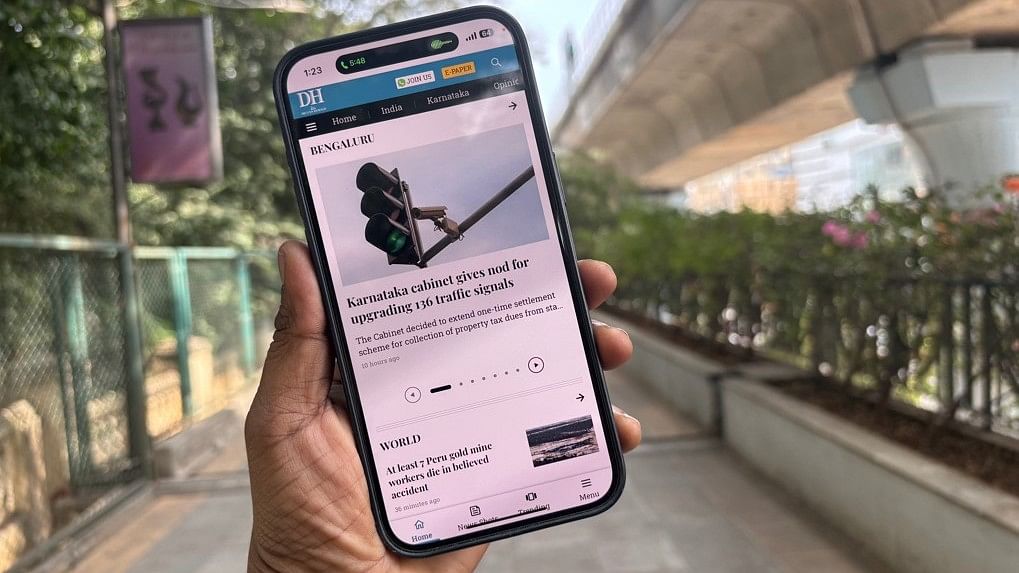
The Telecommunications Bill, 2023 brings several new sweeping changes to protect phone users' privacy security.
DH Photo/KVN Rohit
The government of India on Thursday(December 21) passed a new The Telecommunications Bill, 2023 replacing the old colonial era laws-- Indian Telegraph Act (1885) and the Indian Wireless Telegraphy Act (1933).
The centre says the new bill will consolidate all laws of telecommunication services and most importantly protect national sovereignty, and ensure the privacy security of end users, the citizens of the country.
Here are 10 key aspects of Telecommunications Bill 2023 that will have a significant impact on citizens and cellular service providers in India:
1) If any person fraudulently uses other person's Govt ID to procure SIM, will face imprisonment for up to three years and a maximum penalty of Rs 50 lakh or both. This also includes SIM card spoofing to hide identity from phone call receiver.
2)If a person owns more than nine SIMs (per Aadhaar card), he will be penalised up to Rs 50,000 for the first offence and up to two lakh rupees for each subsequent offences.
3)The new bill makes it mandatory for companies to get prior consent from subscribers to receive specified messages such as advertising messages. Also, they should set up Do Not Disturb registers, and create a mechanism to allow users to report malware or specified messages. Entities providing telecom services must establish an online mechanism for registration and redressal of grievances
4)Telecom service providers must verify the identity of their prospective subscribers only through any verifiable biometric-based identification (linked with Aadhaard card). This will prevent criminals from getting SIM card using fake voter ID or driver's licence
5)Central government shall assign spectrum for telecommunication companies through auction only
6)In exceptional cases such as (1) national security and defence research work, (2) disaster management, (3) weather forecasting, (4) transport, (5) satellite services such as DTH and satellite telephony, and (6) BSNL, MTNL, and public broadcasting services, the telecom spectrum will be allocated on an administrative basis.
7)Providing telecom services without authorisation, or gaining unauthorised access to a telecom network or data, are punishable with imprisonment up to three years, a fine up to Rs two crore or both. Breaching terms and conditions of authorisation is punishable with a civil penalty of up to five crore rupees.
8)Criminals are known to own custom-built SIM boxes, Session Initiation Protocol (SIP) trunk call devices, and Primary Rate Interface (PRI) devices to offer illegal international phone call services and also assist in terror activities. This new Telecommunication Bill 2023 makes possessing such unauthorised telecom equipment, or using an unauthorised cellular network or service, punishable with a penalty of up to ten lakh rupees.
9) In the interest of the nation's security, telecom companies can procure equipment only 'trusted sources' identified by the government
10) For the appointment of TRAI Chairman, the candidate should have at least 30 years of professional experience, and at least 25 years of professional experience to serve as members.
Privacy concerns
Meta (parent company of Facebook, Instagram, WhatsApp), Signal Foundation (Signal messenger), Proton, along with Mozilla and 50 plus companies raised concerns, as social media companies also come under the ambit of The Telecommunication Bill 2023. There is a lack of clarity on some clauses that allow the government to block a service or intercept calls/messages and this voids end-to-end encryption, a critical user privacy guarantee offered by messenger app servicer providers.
The government has claimed that telecommunication interception (phone tapping) will be sanctioned only during public emergencies and on specified grounds such as 1) security of the state, (2) prevention of incitement of offences(communal riots), or (3) public order.
Get the latest news on new launches, gadget reviews, apps, cybersecurity, and more on personal technology only on DH Tech.